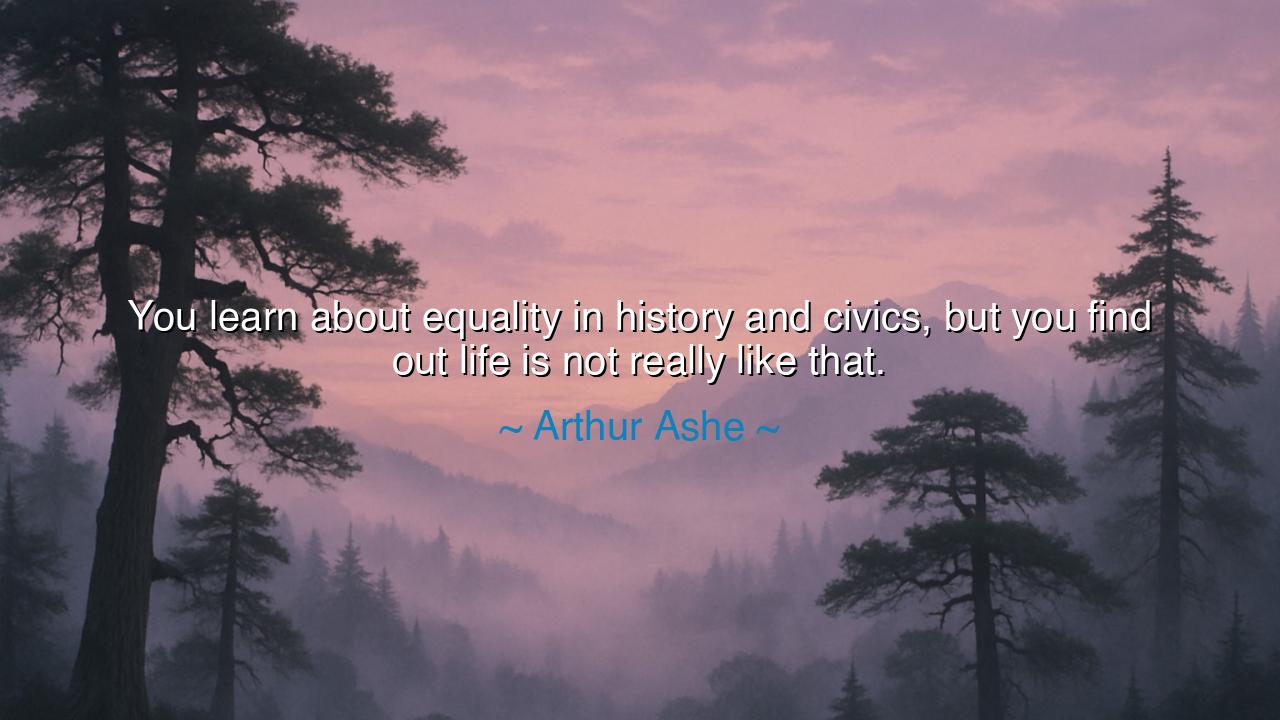
You learn about equality in history and civics, but you find out
You learn about equality in history and civics, but you find out life is not really like that.






“You learn about equality in history and civics, but you find out life is not really like that.” Thus spoke Arthur Ashe, the great athlete and humanitarian, whose words bear the quiet strength of a man who knew both triumph and injustice. In this reflection lies not bitterness, but truth — a truth that pierces through illusion and demands courage from those who hear it. Ashe, who rose from humble beginnings in a divided America to become the first Black man to win Wimbledon, knew better than most that while the idea of equality is celebrated in theory, its practice in life is a long and painful road. His words echo through the ages as a lament and a challenge — a reminder that ideals, though noble, must be fought for anew in every generation.
When he speaks of “history and civics,” Ashe calls to mind the lessons every child is taught: that all men are created equal, that liberty and justice belong to all, that the march of history bends toward fairness. These are the shining promises of civilization, written in constitutions and carved in marble. But when the child steps beyond the classroom and into the world, he soon discovers that these promises are not yet fulfilled. Prejudice still walks in shadowed streets; poverty still binds the hands of the many; and the gate of opportunity still swings open more easily for some than for others. Ashe’s insight is the awakening of the innocent — the moment when a person first sees that ideals are fragile, and that reality, without compassion and courage, betrays them.
Arthur Ashe was born in 1943, in the segregated South, in a time when his color determined where he could live, study, and play. Even as a boy of extraordinary talent, he was denied access to the tennis courts reserved for whites. Yet through discipline and grace, he rose above the walls of discrimination, breaking barriers that seemed unbreakable. When he walked onto the grass courts of Wimbledon in 1975, he carried not only his racket but the weight of history — every Black athlete who had been told “no,” every child who had been denied a chance to dream. His victory that day was more than a sporting triumph; it was a symbol of equality realized, however briefly, in the eyes of the world. Yet Ashe, ever wise, knew that one victory could not erase centuries of imbalance. Even in triumph, he saw how far the world remained from its ideals.
He understood that life is not really like that — not yet. The laws may proclaim equality, but the hearts of men are slower to change. Power still clings to privilege, and injustice often disguises itself as tradition or merit. The same nation that taught him the virtues of freedom also made him a stranger in its own institutions. Yet Ashe did not answer injustice with anger, but with dignity and resolve. His life became a testament to the belief that even when the world fails its own teachings, the individual must not. He fought not only for victory on the court, but for fairness beyond it — advocating for education, for racial reconciliation, for compassion even toward his enemies.
This, then, is the heart of Ashe’s wisdom: to recognize the distance between what is and what ought to be, and to walk that distance with grace. Many, upon discovering that life is not fair, surrender to cynicism or despair. Ashe chose another path — that of noble perseverance. He knew that the world’s imperfection is not an excuse for apathy, but a call to action. The truth that life is unequal must not harden the heart, but awaken it. To live with integrity in an unjust world is to carry light through darkness, to embody the very ideals that others have forgotten.
History itself gives witness to this struggle. When Nelson Mandela emerged from twenty-seven years in prison, he too had every reason to renounce the dream of equality. Yet, like Ashe, he understood that equality must begin not with systems, but with souls. He forgave where others would have cursed; he built bridges where others would have burned them. And though the world still falters, the memory of such men proves that ideals, when lived with courage, can reshape reality. The dream may not yet be fulfilled, but through lives such as theirs, humanity inches closer to its promise.
So, my child of the future, remember what Arthur Ashe taught — that the lessons of equality are easy to recite, but difficult to live. Do not be disheartened when life fails to reflect the ideals you were taught. Instead, become the living proof of them. Treat others with fairness even when the world does not; extend compassion even when none is returned. Stand for justice not when it is convenient, but when it is costly. For every act of integrity, however small, is a step toward the world that history and civics once promised you. And when you find that life is not “really like that,” take it not as a curse, but as your calling — to make it so.
In this, Ashe’s words are not despairing, but prophetic. They remind us that the struggle for equality is not over — that it lives in the choices we make each day. The laws may teach justice, but only the heart can practice it. And if each generation carries this burden with humility and strength, then one day the distance between what is taught and what is lived will vanish, and the lesson of equality will no longer be an ideal — it will be the truth of life itself.






AAdministratorAdministrator
Welcome, honored guests. Please leave a comment, we will respond soon